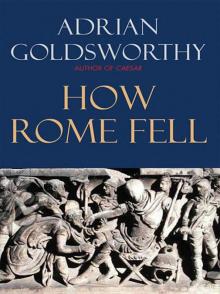Read How Rome Fell: Death of a Superpower Storyline:
Amazon.com ReviewAmazon Best of the Month, May 2009: Adrian Goldsworthy's Caesar: Life of a Colossus was a masterly fusion of vivid historical biography and scholarly detail, an impeccably researched work that also succeeded as a compelling read. With How Rome Fell, Goldsworthy's eye turns to the forces that ultimately destroyed the Roman Empire, challenging the traditional assumption that Rome was sacked by ultimately irrepressible foreign armies. Goldsworthy asserts that Rome's foes in the death throes of empire weren't any more formidable than those at its peak, but that the cutthroat nature of its political system fractured and diverted forces better spent maintaining the integrity of provincial borders--it was civil war and paranoia that destroyed the empire from within. Drawing parallels to modern societies might be tempting, but Goldsworthy is interested in Rome and resists foreboding or moralistic tones--even making a point of acknowledging the different dynamics that drive the rise and fall current powers. In just over 400 pages, How Rome Fell speeds the both the casual and Rome-savvy reader through 400 years of tumultuous and world-changing history--it's a worthy successor to the triumph of Caesar.--Jon ForoFrom Publishers WeeklyStarred Review. At only 40 years of age, British historian Goldsworthy's (Caesar) ninth Roman history offers the same high level of scholarship, analysis and lucid prose as the previous eight. After a superb survey of Roman politics and civilization, Goldsworthy begins with the death in A.D. 180 of emperor Marcus Aurelius, whose reign is traditionally viewed as the apex of Roman power. During the disastrous century that followed, emperors rarely ruled more than a few years; most were murdered, and civil wars raged, though there was some stability during the reigns of Diocletian and Constantine. Invasions slowly chipped away at the empire until it vanished in A.D. 476 with the abdication of the last Western emperor. Goldsworthy makes sense of 300 years of poorly documented wars, murders and political scheming. Highly opinionated, he presents surviving documents and archeological evidence to back his views such as that Constantine became Christian because Roman leaders traditionally believed that divine help won battles, and the Christian god seemed to Constantine like the front-runner. This richly rewarding work will serve as an introduction to Roman history, but will also provide plenty of depth to satisfy the educated reader. Illus., maps. (May) Copyright © Reed Business Information, a division of Reed Elsevier Inc. All rights reserved.Pages of How Rome Fell: Death of a Superpower :
